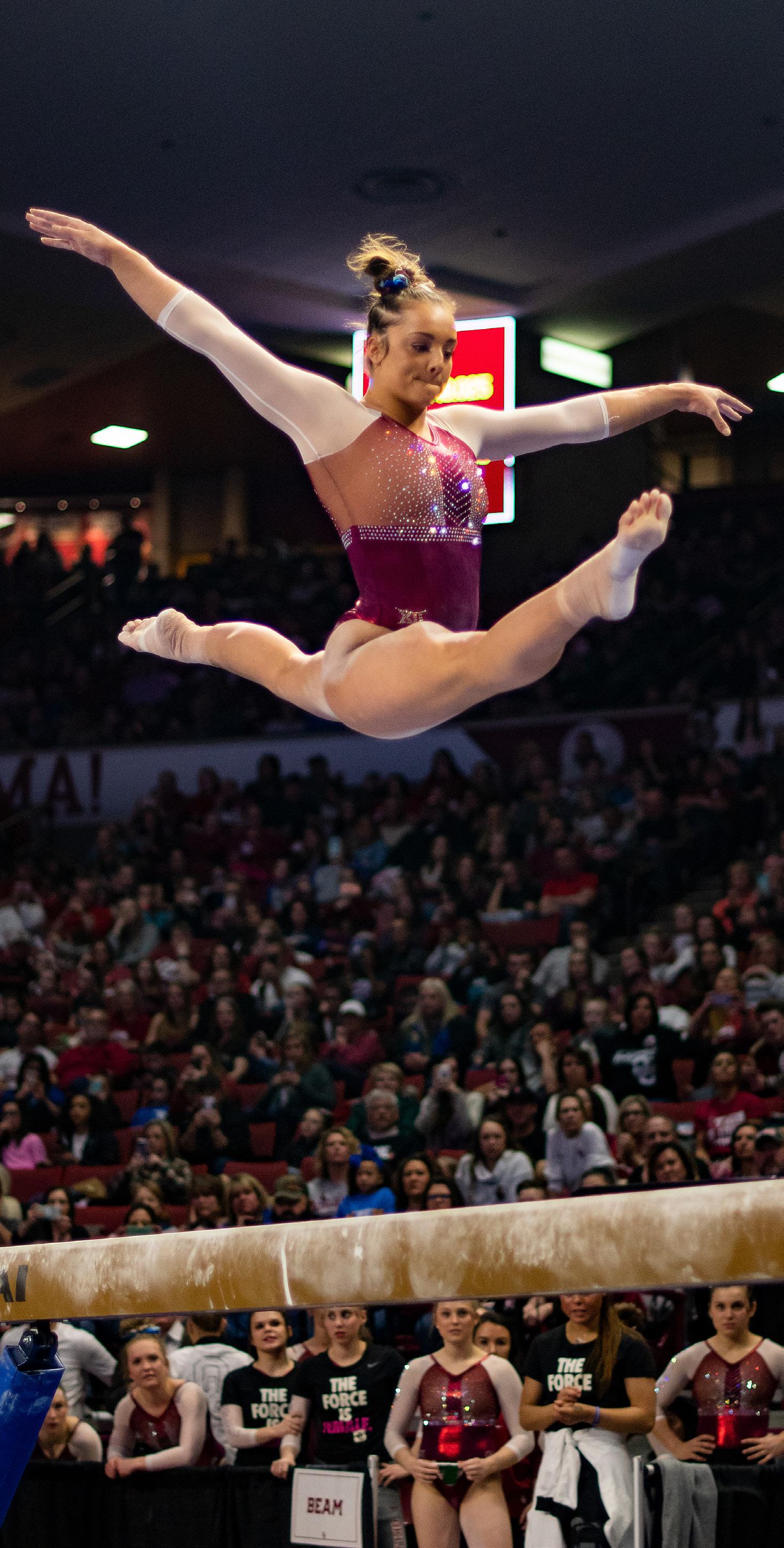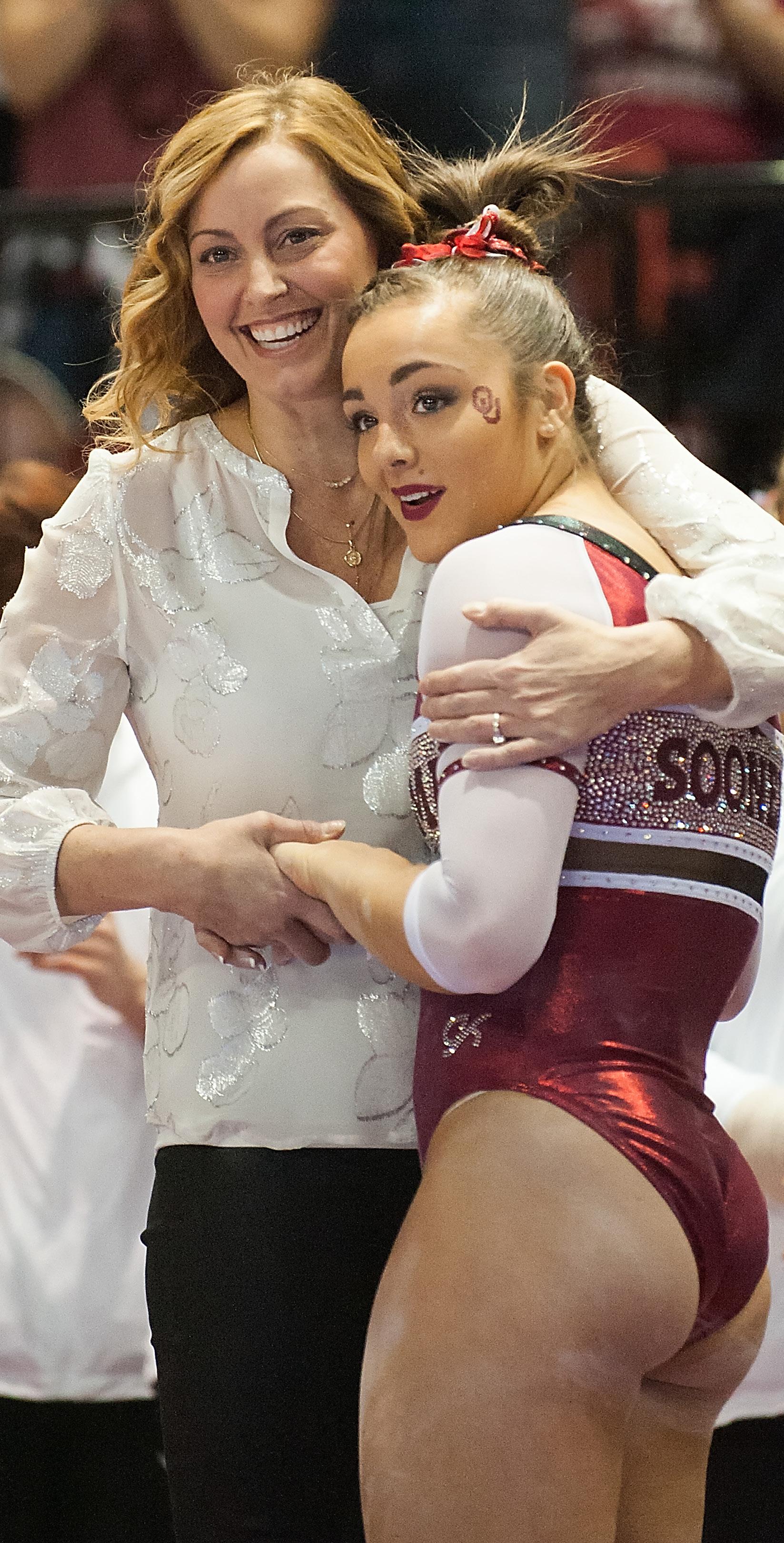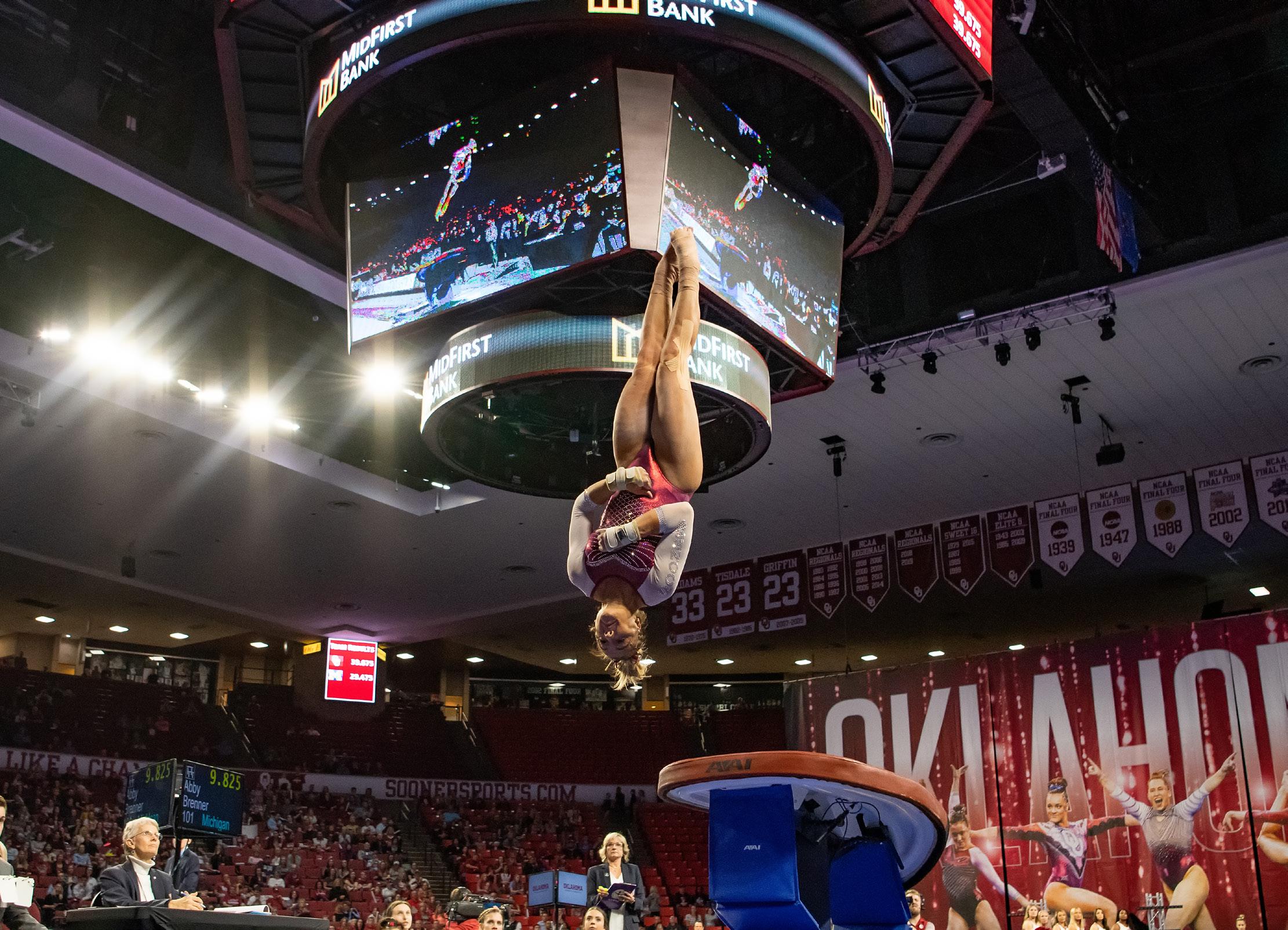
9 minute read
G.O.A.T
Career Profile of Maggie Nichols
By Chris Plank
The G.O.A.T acronym is commonly used in sports to label the Greatest of All Time. Names like Tom Brady, Michael Jordan, Kobe Bryant. A label reserved for the elite.
In college gymnastics, The University of Oklahoma’s Maggie Nichols had earned the right to be called the G.O.A.T. Through adversity and unparalleled success, Nichols forged a path that won’t soon be forgotten or duplicated, despite the fact the it ended far too soon.
From the revelation that she was “Athlete A”, Nichols showed the courage to speak up and speak out against the sexual abuse of former USA Gymnastics doctor Larry Nassar. She became such a powerful voice that she was awarded the 2019 NCAA Inspiration Award.
Through it all, she was still able to put forth flawless performances. She led her team to a pair of national titles, while winning six individual titles and the 2019 Honda Sports Award, considered the women's sports equivalent of the Heisman.
Nichols first caught the eye ofSooner head coach KJ Kindler at age 10, but it wasn’t necessarily because of her skill set.
“We’ve recruited from her gym (Twin City Twisters) forever,” Kindler said. “Her teammate Bree Olson came to OU. She was already committed, so during summer camp she brought a bunch of her teammates and 10-year-old Maggie was one of them.
“She was a scrappy dappy doo. She could do a lot of skills, but her legs were all over the place. It was crazy, but she was 10! You could see her natural talent. She was young but fearless.”
That fearless nature is what stood out to Kindler.
“That is what you look for in a young gymnast, that she has no fear. That kind of athlete mentally is in a good place and you know they will go far.
The cleanness of the sport will come later if you have the natural talent,” Kindler said. “She was a very happy, giggly athlete. She wasn’t an elite yet… but she was special.”
Levels in gymnastics are defined by what skill you can perform and how well you can perform that skill on each event. By the time Nichols committed to OU, she was elite, but had not yet burst onto the national scene.
“When we committed her, she was elite but hadn’t had a ton of success,” Kindler said. “But (she) kept getting better and better, and it was really cool to watch.”
Nichols joined the U.S. National Team in March 2013. In her first meet, she earned a silver medal on the floor exercise and helped lead Team USA to a gold medal.
But it was during the summer of 2014 when Nichols emerged, and visions of a potential spot on the 2016 Olympic Team started to look like a reality.
She was a major part of the 2015 U.S. Women’s World Championships team that claimed a gold medal, and she earned an individual bronze medal on the floor, competing on all four events in team finals.
The summer of 2016 was shaping up to be special for Nichols. She was considered a favorite to make the U.S. Olympic roster and compete for gold in the Summer Olympics in Rio De Janerio.
Despite preparation and excitement over a potential spot, Nichols was living a nightmare away from the gym. She had been one of many members of Team USA that had been sexually abused by team doctor Larry Nasser. Nichols and her coach Sarah Jantzi reported Nassar to USA Gymnastics officials in June 2015 after the coach overheard Nichols and another gymnast talking about Nassar’s behavior. Her teammate and friend Simone Biles came forward shortly after with accounts that she too had been sexually abused by Nassar.

Photo by Mark Doescher
“I got a phone call probably the next day from Steve Penny,” Maggie’s mother Gina said at the time.
Penny was president and CEO of USA Gymnastics.
“He called me, I don’t know how many times, to talk to me about it and make sure that I understood they were taking care of it. When I have the president of USA Gymnastics telling me what to do, he’s in a position of power over me. We’ve given our whole family up to get our daughter to this point and [when] I have Steve Penny telling me this is what we’re going to do, we’re going to be quiet, I’m going to listen to him. I’m not going to jeopardize my daughter’s chance of going to the Olympics.”
Neither Nichols nor Biles had gone public with the accusations beyond the reports to Team USA and, in court filings, she would be referred to as “Athlete A”. The delay in when Nichols reported the abuse and when USA Gymnastics took action is still an issue of concern.
But Nichols showed her determination and resiliency, and she did not let the abuse detour her from her goals. She was going to do everything she could to make the Olympic team, however, in April 2016, adversity struck as she tore her meniscus in training.
“It was definitely one of the worst times of my life,” Nichols said. “I’m not gonna lie. I only had a few months to get ready for the biggest competition of my life that I’d been looking forward to for forever.”
Nichols pushed forward. Despite surgery and struggles during her first meet back, at the P&G Championships in St. Louis, Maggie finished 6th in the all around at the Olympic Trials.
“I was so proud of myself for how far I had come after my injury, but I was definitely nervous and really didn’t know what to expect,” Nichols said. “I thought for sure I had a good chance of being an alternate at least.”
Unfortunately for her, Nichols did not make the team. While many pointed to the knee injury as the reason for her omission, her mother saw other motives.

“They never wanted Maggie to be a part of the Olympics because they didn’t want someone at the Olympics who is telling people she is being molested by the Olympics staff,” Gina Nichols said in an interview with the Norman Transcript. “We were completely abused by USA Gymnastics. They tried to keep her and everybody quiet because they couldn’t let that get out, that one of their top athletes was being molested by their doctor before going to the 2016 Olympics. It was all a part of a cover-up. It was terrible for us. She and our family were treated horribly because she reported abuse and they did not like that.”
While the disappointment of not making the national team loomed, Maggie never let it get her down. She kept pushing forward and reset her focus.
“When I didn’t make that team, my mindset changed with a snap of a finger,” Nichols said. “I was excited to experience college life and be a college athlete. I was not going to dwell on not making the team.”
As soon as Nichols stepped on campus at the University of Oklahoma, her passion was rediscovered. The frustration of the experience with USA Gymnastics was, for the most part, in the rearview. Gymnastics was fun again.
During her freshman season, she recorded her first gym slam, scoring a perfect 10 in all four events in one season. Nichols set the school record for perfect 10s in a career during her freshman season and was first team All-American on the vault, bars and floor. By the end of the season she had helped lead OU to its second consecutive National Championship.
More courageous than even coming forward to report the abuse in the first place, Nichols decided to put a face to “Athlete A” and go public with her experiences with Team USA.

Photo by Mark Doescher
“I felt like it was the right thing for me to do, for myself and for other people,” she said. “I felt like it would help me because I would have a lot of support and people that were behind me.
“Also, I felt like it could help other people come forward. I had so many people reach out and support me after coming out publicly, which was such an honor. I was glad to have people to look up to me and inspire them to come forward as well. It’s definitely different than being an inspiration in athletics.”
Less than a week before her sophomore season, Nichols released her statement. Kindler was right there with her to write the nearly 900-word revelation.
It took nearly two weeks, but it was chilling to read her words and try to understand everything she had lived through. In her statement, she wrote, “Up until now, I was identified as Athlete A by USA gymnastics, the US Olympic Committee and Michigan State University. I want everyone to know that [Nassar] did not do this to Athlete A, he did it to Maggie Nichols.”
She once again dominated college gymnastics during her sophomore campaign and ended up winning the individual all-around during both her sophomore and junior season as well. Twenty eight of OU’s 37 team scores of 198 or better have come since Nichols arrived, and the Sooners have won two national titles, coming within a whisker of a third.

Photo by Mark Doescher
She is the only gymnast in NCAA history with multiple all-around scores of 39.900. During what would be her final meet, unbeknownst to her, she recorded her 22nd career Perfect 10—and nation-high fourth this season — to reach second place all-time in NCAA history, surpassing UCLA’s Kyla Ross. Nichols is six Perfect 10s away from tying the record of 28 set by UCLA’s Jamie Dantzcher.
But her career was cut short in the wildest twist possible. Fears over the spread and dangers of the coronavirus led the NCAA to cancel all spring championships, including the NCAA men’s and women’s basketball tournament, the college world series, the women’s college world series and the NCAA Women’s Gymnastics Championship.
At the time of the cancellations, the Sooners were the No. 1 team in the country, and many considered OU a favorite to repeat as national champions and for Nichols to win her third straight, allaround individual championship.
Nichols took to Instagram to express her sadness and disappointment, but she took it all in stride, focusing on the positives in her life and the impact she made in her farewell Instagram post.
“It’s hard to wrap my head around the fact that I will never have the opportunity to compete for OU again with my team.... but knowing I poured my heart & soul into this sport my whole entire career and ended on a positive note eases my mind, knowing I gave it EVERYTHING I had. Every ounce of my being.”
Nichols career as a student athlete may be over, but she will still be a part of the program.
“She has planned to be our student coach next year,” Kindler said. “She will graduate in December and she is wanting to coach. It’s in her blood, and I can see her doing that.” – BSM













